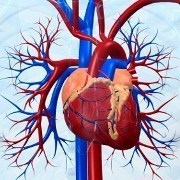 Photo: Getty Images
Photo: Getty Images
Let’s face it, there are a lot of risk factors leading you down the path to future heart disease – diabetes, obesity, high blood pressure, smoking, high blood cholesterol levels, physical inactivity – just to name a few.
According to the Center for Disease Control and Prevention or CDC, 37 percent of all Americans have at least two risk factors for heart disease. The number of Americans affected by individual risk factors varies with physical inactivity leading the charge at almost 40 percent. In 2005-2006, the CDC reported risk factors as follows:
Physical inactivity: 39.5 percent
Obesity: 33.9 percent
High blood pressure: 30.5 percent
Smoking: 20.8 percent
High blood cholesterol: 15.6 percent
Diabetes: 10 percent (CDC 1.)
While some risk factors, such as obesity and smoking, are obvious, others are not quite so transparent. With so many different risk factors, how do you manage your health and keep your risk factors in check? What screening tests do you need and when do you need them? How much weight is too much? When do you know if blood pressure is too much to be healthy?
Managing heart health risk factors can be daunting, but it doesn’t have to be overwhelming. To help you manage your heart health, the American Heart Association recommends the following:
• All heart screening exams, except glucose levels, should begin at age 20.
• Obesity: Begin screening at age 20; weight, as well as body mass index, BMI, and waist circumference should be taken at every visit with your physician.
• High blood pressure: Begin screening at age 20; minimum screening every two years and more frequently if blood pressure is higher than 120/80 mm Hg
• High blood cholesterol: Begin screening at age 20; minimum screening every five years; screening should test total cholesterol levels, low-density lipoprotein, LDL cholesterol, high-density lipoprotein, HDL cholesterol, and triglycerides; those with high blood cholesterol, men over 45, women over 50, and those with other risk factors should be tested more frequently as indicated by their physician.
• Diabetes/blood glucose levels: Begin screening at age 45; minimum screening every three years; high glucose levels increases your risk for type 2 diabetes.
• Other risk factors: smoking, physical activity, diet: Discuss ways to improve diet and exercise habits, as well as ways to quit smoking, if applicable, at every visit with your physician.
If you want to keep this information handy, you can print out a Recommended Settings/Risk Factors quick reference chart from http://www.heart.org/idc/groups/heart-public/@wcm/@hcm/documents/downloadable/ucm_428691.pdf.
Sources:
Heart Health Screenings, American Heart Association, 23 Jun 2011, http://www.heart.org/HEARTORG/Conditions/Heart-Health-Screenings_UCM_428687_Article.jsp
Heart Disease Facts: Americans at Risk, Centers for Disease Control and Prevention, 21 Dec 2010, http://www.cdc.gov/heartdisease/facts.htm
Reviewed July 25, 2011
by Michele Blacksberg R.N.
Edited by Shannon Koehle





Add a Comment2 Comments
Thank you for stressing the importance of heart screening, nowadays. Health screening helps you find out if you have a particular disease or condition even if you feel perfectly well, without any symptoms and signs of disease. Anna Marie from strapless dresses' guide.
October 6, 2011 - 11:42pmThis Comment
Hi Anna, Thank you for writing... I couldn't agree with you more about the importance of health screenings. Personally, I'd rather be proactive than have to react to an event after the fact. Mary
October 16, 2011 - 8:01pmThis Comment